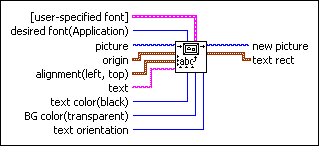 |
[user-specified font] specifies the specific font characteristics for the text to draw. The VI ignores this input unless desired font is User-specified Font.
 |
Font Name specifies the font to use for the text. If you misspell the font name or specify a font that is not installed on the computer, the operating system selects a font.
|
 |
Size specifies the size of the font in points.
|
 |
Strikeout? specifies if the text appears in strikeout. If Strikeout? is TRUE, the text appears in strikeout.
|
 |
Italic? specifies if the text appears in italics. If Italic? is TRUE, the text appears in italics.
|
 |
Underline? specifies if the text is underlined. If Underline? is TRUE, the text appears underlined.
|
 |
Outline? specifies if the text is outlined. If Outline? is TRUE, the text appears outlined.
|
 |
Shadow? specifies if the text has a shadow. If Shadow? is TRUE, the text appears in shadow.
|
 |
Bold? specifies if the text is bold. If Bold? is TRUE, the text appears bold.
|
|
 |
desired font specifies the text font.
| 0 | User-specified Font | | 1 | Application Font (default) | | 2 | System Font | | 3 | Dialog Font |
|
 |
picture is the picture to which you want to add the text string. The default is an empty picture.
|
 |
origin is the coordinate of the starting point of the text.
 |
x is the horizontal coordinate that increases to the right.
|
 |
y is the vertical coordinate that increases to the bottom.
|
|
 |
alignment specifies the location of the text relative to the origin you specify.
 |
horizontal sets the horizontal position of the text with respect to the origin.
| 0 | left—The horizontal component of origin specifies the left edge of the text. | | 1 | center—The horizontal component of the origin specifies the center of the text. | | 2 | right—The horizontal component of origin specifies the right of the text. |
|
 |
vertical sets the vertical position of the text with respect to the origin.
| 0 | top—The vertical component of origin specifies the top edge of the text. | | 1 | center—The vertical component of the origin specifies the center of the text. | | 2 | bottom—The vertical component of origin specifies the bottom of the text. |
|
|
 |
text is the string to draw in the picture.
|
 |
text color is the color of the text. The default is black. You can wire a color box constant to this input.
|
 |
BG color is the color of the background of the text. The default is transparent.
You can wire a color box constant to this input.
|
 |
text orientation sets the orientation of the text to draw.
| 0 | None (default)—Text appears normal. | | 1 | Stacked—Text appears stacked. | | 2 | Clockwise—Text appears rotated 90° clockwise, which results in vertical text that reads downward. | | 3 | Counterclockwise—Text appears rotated 90° counterclockwise, which results in vertical text that reads upward. |
|
 |
new picture is the picture that contains the new image. You can wire this output to any other picture input to add more drawing instructions to the picture. You also can wire this output to the Picture to Pixmap VI to obtain an image data cluster. You then can use the Graphics Formats VIs to save the image data to a file. You can wire this output to the Concatenate Strings function to concatenate the output from multiple Picture Functions VIs so that they draw on a single picture control.
|
 |
text rect is a cluster that contains coordinates that describe the left, top, right, and bottom coordinates of the outer edges of the rectangle.
 |
left is the horizontal coordinate of the left edge of the rectangle.
|
 |
top is the vertical coordinate of the top edge of the rectangle.
|
 |
right is the horizontal coordinate of the right edge of the rectangle.
|
 |
bottom is the vertical coordinate of the bottom edge of the rectangle.
|
|

 Add to the block diagram
Add to the block diagram Find on the palette
Find on the palette









